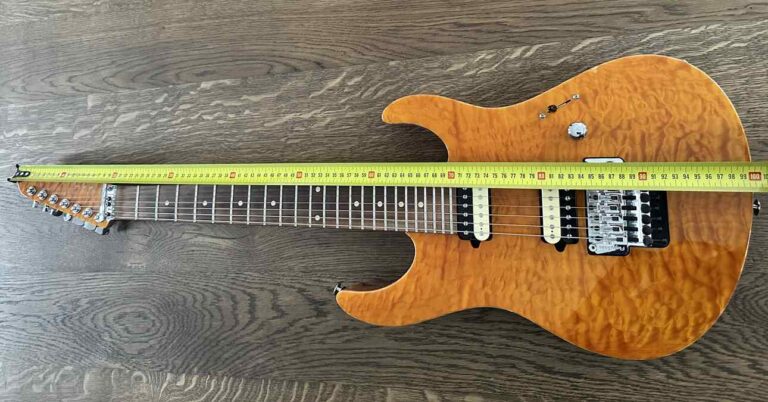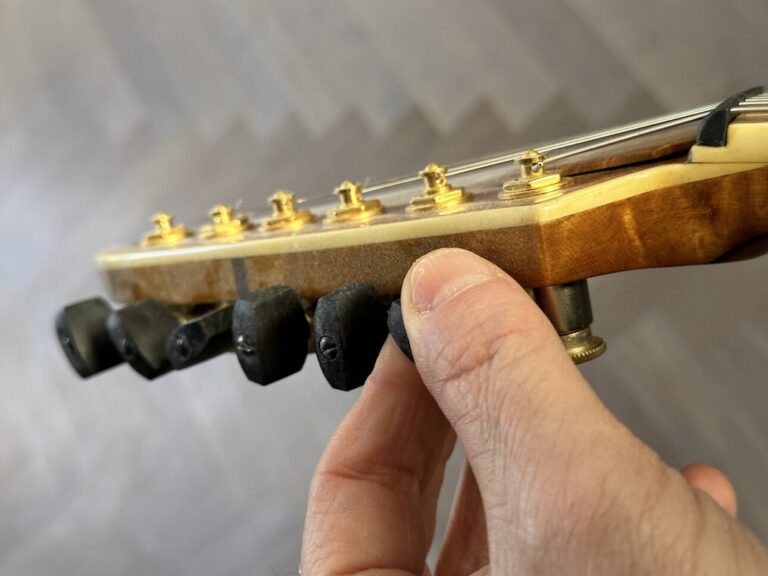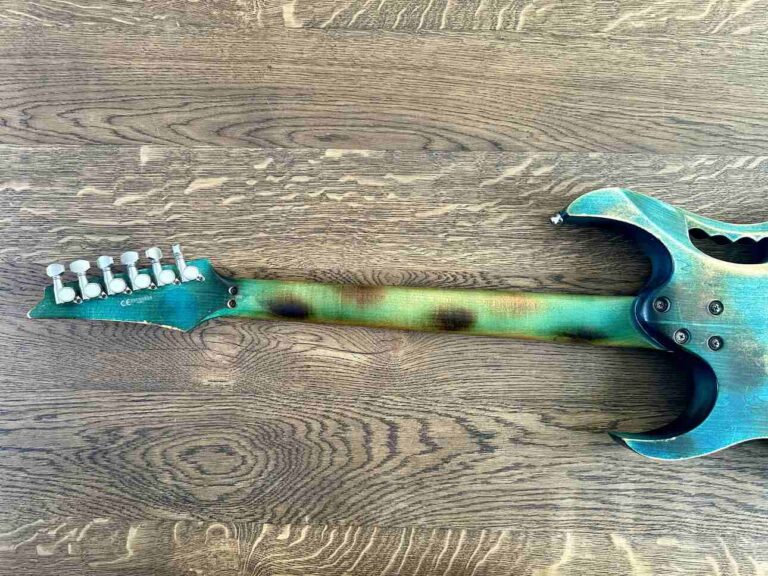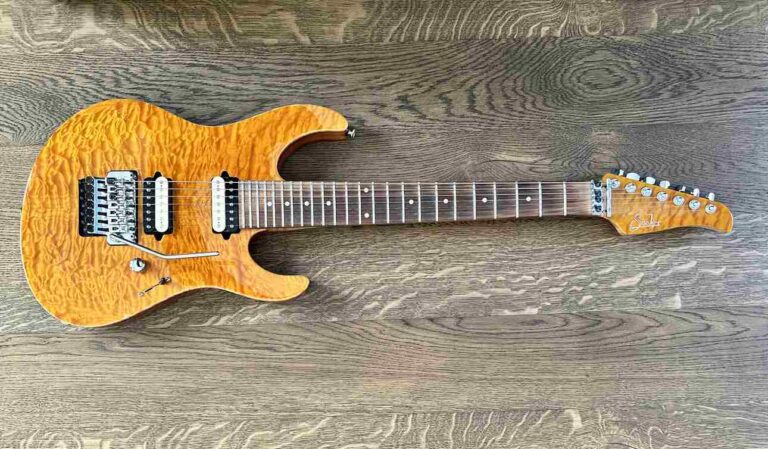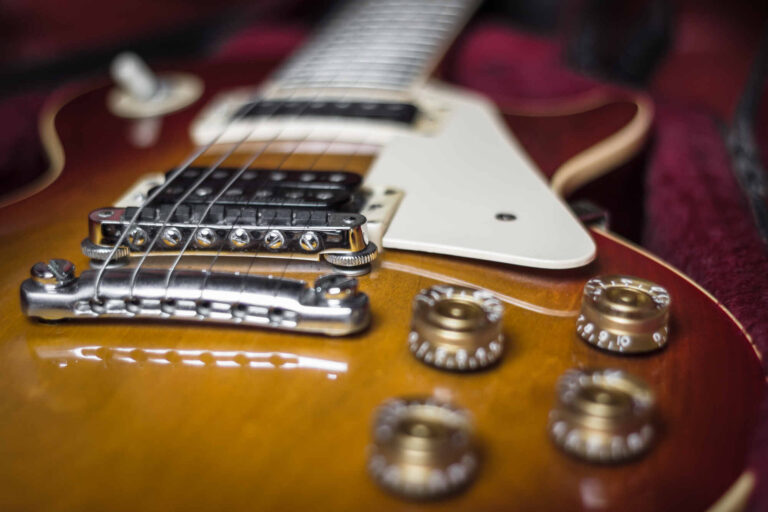Are Cheap Guitars Really Harder to Play than expensive ones?
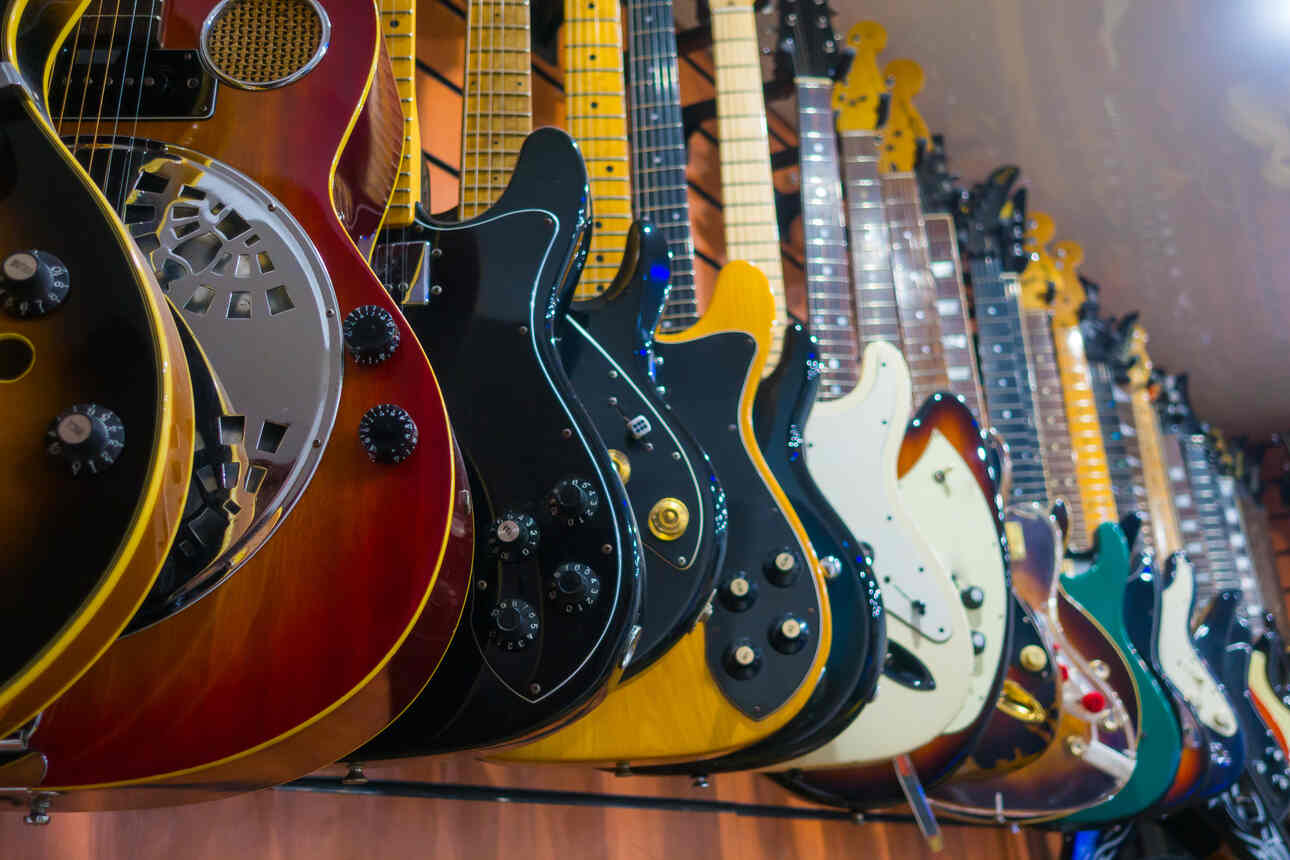
When you first start playing guitar, you might wonder if a cheap guitar is harder to play. The simple answer is yes. Cheap guitars can be harder to play. They often have lower-quality materials and construction. This can affect how easy it is to press down the strings or how well the guitar stays in tune.
Cheap guitars might not have the best sound quality, either. The electronics in affordable electric guitars may produce a more muddled sound. This can be frustrating if you’re a beginner.
Accessories like strings and picks can also impact your experience. And higher-end guitars usually come with better equipment.
Oh yeah, perceptions matter, too. Some people believe expensive guitars are always better, but that’s not always true. Many beginners start with cheap guitars and do just fine. It’s all about balancing price and playability that works for you.
Alright, let’s look at all the ins and outs of cheap guitars and their playability!
Key Takeaways
- Cheap guitars can be harder to play due to lower-quality materials;
- Sound quality and electronics are usually better in more expensive guitars;
- Beginners can still start with cheap guitars and improve their skills.
Understanding Guitar Pricing
Guitar pricing is influenced by various factors that affect its cost and playability. Here’s a look at what determines a guitar’s price and how that impacts its playability.
Factors Influencing Guitar Cost
Several factors impact the cost of a guitar.
Materials play a significant role. For instance, guitars made from high-quality wood like mahogany or maple tend to be more expensive.
Construction methods also matter. Handmade guitars are often (much) pricier due to the labor involved in building them. Factory-made ones are made much quicker, so they are more cost-effective.
Brand reputation can influence price. Established brands may charge more for their name recognition.
Finally, features and electronics like pickups, tuners, and preamps add to the cost. High-value wood is also more difficult to get, increasing the price.
Price Vs. Playability
Price does not always determine how easy a guitar is to play.
Cheap guitars can be harder to play due to lower quality control and materials. They may have higher action (the strings’ height from the fretboard). This makes it harder to press down the strings.
Expensive guitars often provide better craftsmanship. This results in smoother fretboards and lower action, making them easier to play.
Budget-friendly guitars are popular because they are affordable. But you may need to adjust them to improve playability.
Playability Considerations
High Action Challenges
High action means the strings are far from the fretboard, making it tough to press the strings down. This can cause finger fatigue and make playing fast parts harder.
Due to less precise manufacturing, cheap guitars often have high action. If your guitar action is too high, it might need adjustments.
Lowering the action can make a big difference in how easy the guitar is to play. Beginners, in particular, can struggle with high-action guitars.
The Impact of Construction Quality
The construction quality of a guitar definitely affects playability. This includes the materials and how well it’s built.
Cheap guitars might use lower-quality wood and parts. This can lead to issues like uneven frets or poor neck alignment. These problems make the instrument hard to play and keep in tune.
Good construction ensures the guitar feels comfortable in your hands and responds well to your playing.
Sure, not all affordable guitars are poorly made, but spending a bit more can often get you a guitar that’s easier to play.
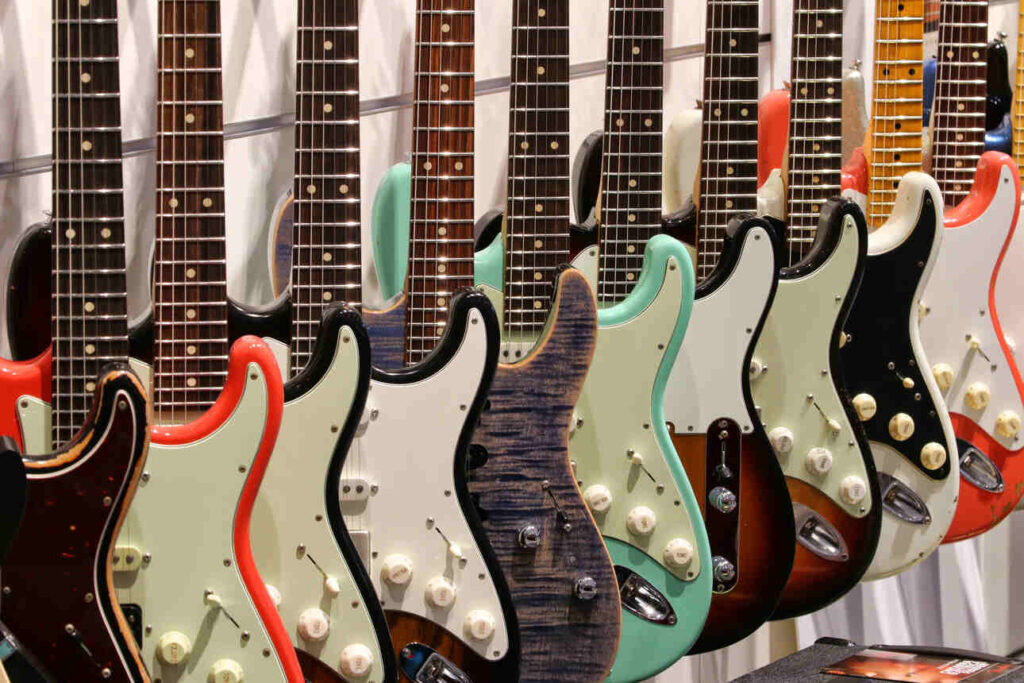
Setup and Adjustability
A good setup makes the guitar fit your playing style. This involves adjusting the action, intonation, and neck relief.
Many cheap guitars come from the factory with poor setups. A proper setup can make a cheap guitar feel much better.
Tweaks to the truss rod, bridge, and nut can lower the action, improve intonation, and make the guitar easier to play. Have a pro do it for you to make sure it’s done well.
Tuning Stability
Tuning stability is crucial to playing without interruption. I mean, if you need to tune in all the time, it takes away the fun of playing and makes you sound bad, no matter how good you are.
Cheap guitars often have low-quality tuning machines. They slip. Which sucks. Because this causes the guitar to go out of tune quickly. I promise you, this can be frustrating. It can interrupt your practice or performance.
More expensive guitars generally have better hardware. This surely includes tuners that hold the pitch more reliably.
Replacing the tuners can help you big time if you’re struggling with tuning issues.
Sound Quality and Electronics
Pickups and Amplification
Pickups play a crucial role in your electric guitar’s sound. They convert string vibrations into electrical signals.
Single-coil pickups offer a bright, clear tone. Humbuckers provide a thicker, warmer sound.
Expensive guitars often have higher-quality pickups. This leads to better sound clarity and less noise.
Cheap guitars may come with low-grade pickups. They could produce muddier sounds or unwanted hum.
Upgrading pickups can improve the sound of a cheap guitar, making it closer to that of a high-end model. This tweak alone can significantly change how a cheap guitar sounds.
Wood and Resonance
The type of wood used in a guitar influences its tone and resonance.
Expensive guitars often use high-quality woods like mahogany, maple, or rosewood. These deliver richer, more resonant sounds.
Acoustic guitars, in particular, benefit from solid wood tops. They enhance sound quality over time.
Cheap guitars might use laminate or cheaper woods, negatively affecting the sound. Laminated wood tends to offer less resonance and sustain.
This difference is crucial for acoustic guitars. Wood’s ability to vibrate freely impacts the sound. So, the choice of materials can often be the deciding factor in sound quality.
Expensive guitars often provide better craftsmanship. This results in smoother fretboards and lower action, making them easier to play.
Comparing Cheap and Expensive Guitar Sounds
When comparing cheap and expensive guitars, sound quality differences become clear.
High-end guitars typically offer better clarity, sustain, and tonal richness. Because of better electronics, superior construction, and higher-quality materials. Guitar sounds can range from crisp and clean to warm and full.
But cheap guitars might sound duller or less dynamic. This doesn’t mean they are unplayable.
Many affordable axes still provide decent sound, especially for beginners. Upgrades like new pickups or better strings can enhance their sound quality.
In short, choosing between a cheap or expensive guitar depends on your budget and your ear for sound differences.
The Role of Guitar Accessories
Guitar accessories can make a big difference. Some are necessary for practical reasons, while others can improve your playing experience.
Essential Accessories for Any Guitar
When you start playing the guitar, a few accessories are critical.
A tuner helps keep your guitar in tune, which is key for good sound.
You might also need a capo. This tool changes the pitch of your guitar, making some songs easier to play.
A good strap is important if you play standing up. It keeps your guitar secure and comfortable.
Don’t forget about picks. They come in different shapes and sizes; trying a few can help you find what feels best.
For those playing electric guitar, an amp is a must. It projects your sound and allows for different effects. Without it, your electric guitar will be quiet.
Acoustic players might want a gig bag or case to protect their guitar when they carry it around.
Strings are another essential. Different gauges and materials can affect how your guitar feels and sounds, so keeping a few spare sets is a good idea.
Does Better Gear Improve Playability?
Upgrading accessories can make playing easier and more enjoyable.
For example, investing in a higher quality tuner can save you time and frustration. A custom-fit strap can reduce strain during long sessions.
High-end amps can offer better sound quality and versatility. Different models and brands provide various tones that are fit for rock, jazz, or blues. Trying a few can help you match one with your playing style.
Picks made from premium materials might feel more comfortable and produce better sound. Experimenting with different types can lead to a better playing experience.
Replacing stock strings with higher quality options can also improve your guitar’s sound. Different materials and thicknesses can affect both tone and playability. If you play often, better strings can last longer and be worth the investment.
Perceptions and Myths
Many people have beliefs about cheap guitars. These ideas affect how they view these instruments, both positively and negatively.
The Stigma of a Cheap Guitar
Cheap guitars often get a bad reputation. People think they break easily or don’t sound good.
Some believe these guitars are only for beginners. This can prevent more serious players from trying them out.
They worry that using a cheap guitar will make them look like they don’t know what they’re doing.
Others think cheap guitars are hard to play because they aren’t made well. Strings might be too high off the fretboard, for instance.
Yes, this can happen, but it isn’t always true for every cheap guitar. Today, many affordable guitars are made with much better quality.
Frequently Asked Questions
What factors make some guitars harder to play than others?
Several aspects affect a guitar’s playability. This includes neck size, string action, and fret quality. A thick neck can be tricky for small hands. And high string action makes pressing strings harder. Poor fret quality can lead to buzzing or sore fingers.
Can the quality of a guitar affect beginners’ learning progress?
Yes, it can. Beginners might struggle on cheap guitars if they have high action or rough frets. Quality instruments tend to be more comfortable. This helps you learn faster and stay motivated.
Do more expensive guitars typically offer easier playability?
Often, yes. Higher-end guitars usually have better craftsmanship, which means smoother playability. Brands focus on making these guitars comfortable to handle. This can make playing more enjoyable.
What are common issues faced when playing on less costly guitars?
Cheap guitars often suffer from inconsistent tuning and higher string action. You might also find that they have rough frets and lower sound quality. These issues can make practice sessions frustrating.
How does the build quality of a guitar impact its ease of tuning?
A well-built guitar stays in tune longer. Budget guitars might use cheaper materials. This leads to tuning pegs that slip more easily, which can be annoying.
What are the potential drawbacks when purchasing a budget guitar?
Budget guitars may have several downsides. These include lower sound quality, rough frets, and inconsistent tuning. These can make playing and learning more challenging. They may also discourage new players.

